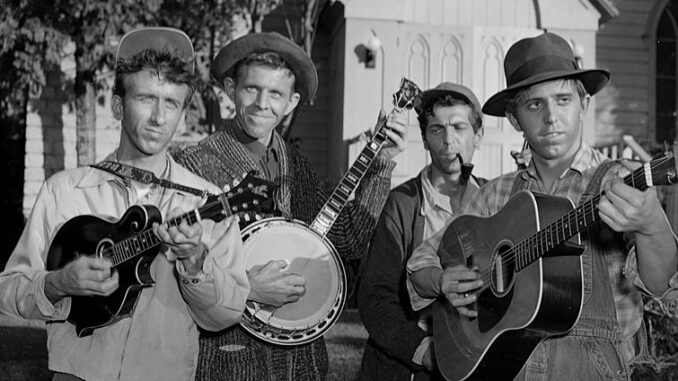
Mayberry's Minor Rebellion: Andy, The Darling Boys, and the Rock 'n' Roll of Dooley
Mayberry, North Carolina. The name itself conjures images of lazy afternoons, wholesome values, and the gentle hum of a simpler life. Sheriff Andy Taylor, the linchpin of this idyllic community, embodies its grounded morality and quiet wisdom. Yet, even in Mayberry, the currents of change, the restless energy of youth, and the allure of something… different, could occasionally stir. This bubbling tension found its most memorable expression in the unlikely collision of Andy Taylor, the boisterous Darling Boys, and the rebellious spirit of rock 'n' roll embodied in the song "Dooley."
The Darling Boys, a mountain clan as wild as the bluegrass they played, were recurring guests in Mayberry, bringing with them a raw, untamed energy that both charmed and challenged the town's placid demeanor. Patriarch Briscoe, with his grizzled beard and mischievous glint in his eye, was a force of nature, while his sons, each with a unique instrument and a penchant for chaotic harmonies, were a living, breathing embodiment of rural grit. Their music, rooted in tradition, was undeniably infectious, but it also lacked the polished veneer of mainstream entertainment.
Enter "Dooley," a fictional lament for a moonshiner’s plight, steeped in the earthy rhythms and rebellious undertones that were beginning to define rock 'n' roll. While not exactly the screeching guitars and leather-clad rebellion of the era, "Dooley" represented a nascent shift in musical sensibilities, a departure from the more genteel sounds that usually echoed through Mayberry's streets. It was music with a story, a tinge of danger, and a healthy dose of unrepentant swagger.
The brilliance of the "Andy & The Darling Boys Rock Dooley" episode lies in its ability to juxtapose the familiar comfort of Mayberry with this burgeoning counter-culture. Andy, ever the pragmatic lawman and benevolent father figure, initially approaches "Dooley" with a mixture of bemusement and apprehension. He recognizes the song's inherent appeal, its catchy melody and relatable theme of the underdog, but he also senses its potential to disrupt the town's carefully curated equilibrium. He is, after all, tasked with maintaining order, and rock 'n' roll, even in its mildest form, felt like a step away from the safe, predictable routines he valued.
As the Darling Boys launch into their rendition of "Dooley," the episode subtly charts Andy's evolving perspective. He witnesses the joy the music brings to the townspeople, the uninhibited dancing and singing that break through the usual reserve. He sees the way "Dooley" connects with the younger generation, offering them a sense of identity and a voice to express themselves. And perhaps, most importantly, he recognizes that the song, despite its unconventional nature, is ultimately harmless, a form of entertainment that poses no real threat to Mayberry's core values.
Andy's own participation in the performance solidifies this message. He picks up his guitar, joining the Darling Boys in a joyful rendition of "Dooley," signaling his acceptance of this new musical form and his willingness to bridge the gap between tradition and innovation. It's a powerful moment, demonstrating Andy's ability to adapt and embrace change while remaining true to his own principles. He doesn't become a rock 'n' roll convert, but he acknowledges its validity, its capacity to bring people together, and its place within the ever-evolving tapestry of American culture.
Ultimately, "Andy & The Darling Boys Rock Dooley" is more than just a lighthearted episode of a beloved sitcom. It's a microcosm of the broader cultural shifts happening in America at the time. It's a testament to the enduring power of music to transcend generational divides and bridge cultural gaps. And it's a reminder that even in the most seemingly idyllic communities, the seeds of change are always present, waiting for the right song, the right moment, to blossom. The episode’s lasting appeal lies in its gentle exploration of these themes, presented with the warmth, humor, and heartwarming optimism that defined Mayberry and made it a timeless symbol of American innocence, even in the face of the burgeoning rock 'n' roll revolution. The classic performance wasn't just about the music; it was about the enduring spirit of Mayberry, its capacity to welcome the new while cherishing the old, a harmonious blend that resonated with audiences then and continues to resonate today.